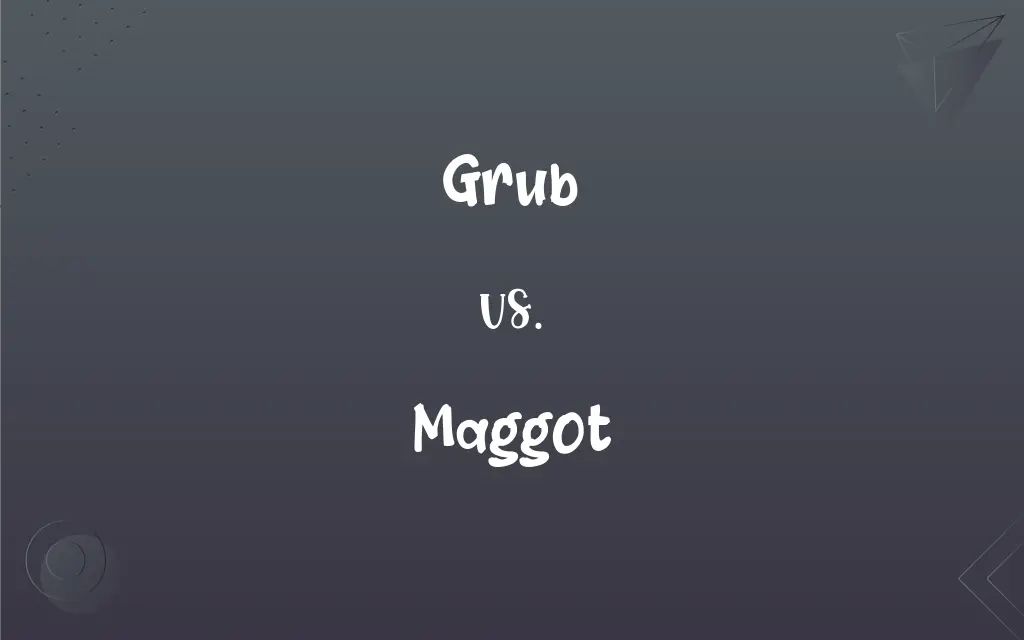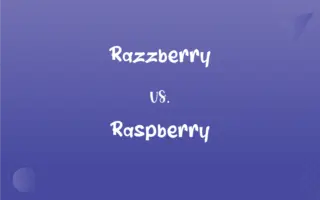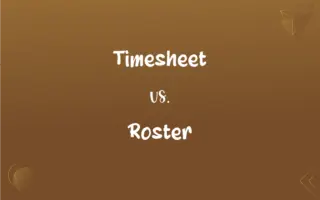Grub vs. Maggot: What's the Difference?
Edited by Janet White || By Harlon Moss || Updated on November 6, 2023
Grub can refer to food or a larval stage of some insects, whereas maggot specifically denotes the larva of a fly.

Key Differences
Grub and maggot both describe larval stages of insects, but not all grubs are maggots. A grub typically refers to the larva of beetles, whereas a maggot specifically refers to the larva of a fly. Grubs are generally thicker and often found in soil, feeding on roots, while maggots are usually found in decaying matter.
Grub can also be a colloquial term for food, reflecting its origin in the larval stage of an insect that consumes a significant amount of food. This is not the case with maggots, as the term doesn’t carry a secondary meaning related to human food consumption. When one says they’re getting some grub, they mean food, not insect larvae.
In terms of appearance, grubs often have a C-shaped body, a creamy white color, and a brownish head. Maggots, however, are typically slender, elongated, and whitish in color, without a distinct head. The visual difference is clear: grubs look more like stout worms, while maggots are more uniformly cylindrical.
When considering their respective life cycles, grubs will eventually become beetles, a distinct evolution from maggots, which will develop into flies. The habitats of grubs tend to be more varied, including soil, wood, or within plants, whereas maggots are primarily found in decomposing organic matter, highlighting their role in the decomposition process.
Both grubs and maggots play important roles in the ecosystem. Grubs can be both beneficial and pests, contributing to soil aeration or damaging plant roots. Maggots are nature's recyclers, breaking down dead tissue. Despite their similar larval status, grubs and maggots have different ecological impacts and evolutionary paths.
ADVERTISEMENT
Comparison Chart
Definition
A general term for beetle larvae or colloquially, food.
The larva of a fly, often found in decaying matter.
Shape
Typically C-shaped with a distinct head.
Slender, elongated, and usually without a distinct head.
Habitat
Found in soil, wood, or inside plants.
Primarily found in decomposing organic material.
Life Cycle
Develop into beetles.
Develop into various species of flies.
Usage in Language
Can refer to food in slang.
Does not have a colloquial use related to food.
ADVERTISEMENT
Grub and Maggot Definitions
Grub
A term for a soft-bodied, thick, and often C-shaped larva.
The fisherman used a grub as bait for fishing.
Maggot
A fishing bait used for catching certain types of fish.
He stocked his tackle box with maggots for the fishing trip.
Grub
The larva of a beetle or other insect.
She found a grub in the garden while planting tomatoes.
Maggot
The larva of a fly found in decaying matter.
Maggots were found in the compost bin, helping break down the waste.
Grub
Informal term for food.
Let's go grab some grub before the movie starts.
Maggot
A term used to describe soft-bodied, legless larvae that feed on decay.
Maggots are commonly used in medical treatments to clean wounds.
Grub
Slang for the act of eating.
We grubbed on pizza and wings all night.
Maggot
A derogatory term sometimes used to describe a despicable person.
He was called a maggot by the angry crowd for his actions.
Grub
A creature in its development stage before it transforms into its adult form.
The gardener was careful not to harm the grub that would soon become a beautiful beetle.
Maggot
An organism that plays a role in the process of decomposition.
The presence of maggots indicates that the decomposition is well underway.
Grub
To dig up by or as if by the roots
Grubbed carrots with a stick.
Maggot
The legless, soft-bodied, wormlike larva of any of various dipteran flies, often found in decaying matter.
Grub
To clear of roots and stumps by digging
Grubbed a small plot.
FAQs
What do grubs eat?
Grubs commonly feed on roots, wood, or plant material.
Can the word grub also mean food?
Yes, grub is slang for food in English.
Are all grubs a type of maggot?
No, grubs are beetle larvae, while maggots are fly larvae.
Is it common to use maggots in medical treatment?
Yes, maggot therapy is used for cleaning non-healing wounds.
What do maggots eat?
Maggots feed on decaying organic matter.
How can you prevent maggots in trash cans?
Keeping trash cans clean and tightly sealed can prevent maggots.
Are maggots harmful to humans?
Maggots are not directly harmful but can indicate decay or unsanitary conditions.
Can grubs be used for fishing bait like maggots?
Yes, some fishers use grubs as bait due to their soft body.
Do grubs and maggots look the same?
No, grubs are typically C-shaped, while maggots are slender and elongated.
Do both grubs and maggots turn into beetles?
No, only grubs turn into beetles, while maggots turn into flies.
Are grub and maggot interchangeable terms?
No, they refer to specific larvae of different insects.
Do maggots have a role in the ecosystem?
Yes, they help decompose dead organic matter.
Is it offensive to call someone a maggot?
Yes, it's a derogatory term and should be avoided.
What's the best way to get rid of grubs in your garden?
Nematodes and milky spore disease can be natural controls for grubs.
How quickly do maggots develop into flies?
Maggots can develop into adult flies in as little as 24 hours in warm conditions.
Are there any natural predators of grubs?
Yes, birds, moles, and other insects eat grubs.
Are maggots always found in dirty places?
Mostly, but they are also used in controlled settings for waste management and medical treatments.
Can finding grubs in the soil be beneficial?
Yes, some grubs aerate soil, although others may damage plants.
What kind of fly larvae are maggots?
Maggots are larvae of flies, typically the common housefly.
Can you eat grubs as you would 'grub'?
While grubs are edible insects in some cultures, 'grub' as slang for food usually refers to conventional food items.
About Author
Written by
Harlon MossHarlon is a seasoned quality moderator and accomplished content writer for Difference Wiki. An alumnus of the prestigious University of California, he earned his degree in Computer Science. Leveraging his academic background, Harlon brings a meticulous and informed perspective to his work, ensuring content accuracy and excellence.
Edited by
Janet WhiteJanet White has been an esteemed writer and blogger for Difference Wiki. Holding a Master's degree in Science and Medical Journalism from the prestigious Boston University, she has consistently demonstrated her expertise and passion for her field. When she's not immersed in her work, Janet relishes her time exercising, delving into a good book, and cherishing moments with friends and family.































































